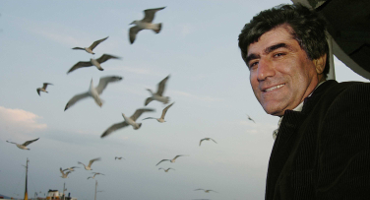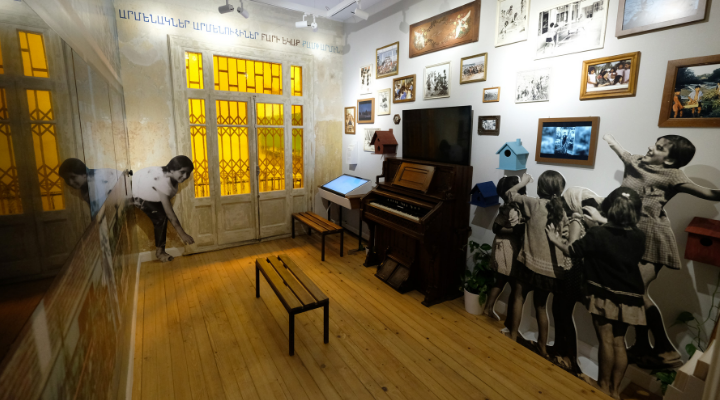Hrant Dink was born in Malatya on September 15, 1954. He moved to Istanbul with his family when he was five years old. After his mother and father were separated, Hrant Dink and his two brothers went to live at the Gedikpasa Armenian Protestant Church Nursery School. The three brothers all attended Incirdibi Primary school, which was run by the same church, in winter time and lived at the Tuzla Armenian Childrens Camp of the school during their summers. Hrant Dink graduated from Bezciyan junior high school and studied at the Surp Hac Tibrevank boarding school before he completed his high school education at Sisli High.
He married Rakel Yagbasan, originally from the Armenian Varto tribe from Silopi in the Southeast of Turkey. They had three children. Dink studied zoology and philosophy at Istanbul Universitys Faculty of Science. He abandoned his dreams of a biological philosopy department at the university at the expense of his active engagement in the developing politics of the left. He was worried that his political engagement could be linked to his Armenian identity and harm the Armenian community living in Turkey, so he changed his name to the Turkish name Firat through the court verdict.
Within this period Hrant Dink and his wife Rakel took over the administration of the Tuzla Childrens Camp, where they themselves once grew up and began looking after countless Armenian children. The camp underwent difficult times under the accusation of breeding Armenian militants there and was finally confiscated by the State in 1983. Following the closure of the camp, Dink was taken into custody and arrested three times due to his political views.
During 1990s Hrant Dink ran a bookstore with his brothers in Istanbul. He also started writing for the Armenian daily newspaper, Marmara. He especially wrote reviews of books about Armenian history printed in Turkey under the pseudonym Cutak which means, violin in Armenian.
On April 5th 1996, Hrant Dink took part in the foundation of Agos - the first weekly newspaper to be published in Istanbul in both Turkish and Armenian. The word Agos was used in both languages meaning the place where the plough opens a hole in the soil to give the seed in as a source of fertility. The newspapers policy was shaped in the light of this symbolic partnership and fertility. The main purpose of the paper was to create a solidarity with the section of Turkish Armenian community unable to speak their mother tongue; to give voice to the problems of Turkish Armenians at the state level and gain the support of the wider public; and to share the Armenian culture and history with Turkish society.
Agos attracted attention with its left-wing, opposition identity. It also criticized weaknesses within the system of the Turkish Armenian community underlining the importance of transparency and of civil society with alternative projects.
As the editor in chief of Agos, Hrant Dink attracted public attention with his rhetoric, which opened new frontiers of debate. He also wrote columns for Yeni Yüzyıl and BirGün daily newspapers.
He brought many striking topics onto the agenda such as establishing neighborly relations between Turkey and Armenia, opening of the border between the two countries, supporting the democratization process of Turkey, speaking about the events of 1915 in a new emphatic style focusing on the surviving and converted Armenians too and recognizing the honor of both sides rather than a hurtful approach viewing the dead as mere figures. He also raised the need to develop alternative publications on those events in Turkey in addition to the sources that supported the official, state thesis.
Having attended many conferences in America, Australia, Europe and Armenia, Hrant Dink prompted a debate and questioning process on Armenian identity and Turkish -Armenian relations both in the Armenian world and also in various western countries as to their historical role in Turkish-Armenian relations.
Anti- Campaigns and Court Cases
In 2002 Hrant Dink was sued for a speech he made at a conference in Urfa about identity and citizenship. It was 2006 by the time he was finally acquitted. However the real intense period of court cases he was subjected to began in February 6, 2004 when an article was published in Agos under his name claiming that Sabiha Gokcen, the step-daughter of Ataturk, the founder of the Turkish Republic, might be of Armenian origin and had relatives in Armenia. In the story, entitled Secret of Sabiha Hatun, Hripsime Sebilciyan, an Armenian from Gaziantep, the Southeast of Turkey, who later took Armenian citizenship, claimed that she was Gökçens niece and Sabiha Gökçen was an Armenian orphan adopted from an orphanage.
Two weeks later on February 21st, Hürriyet, the biggest daily paper of Turkey, carried the story to its headline: Is she Sabiha Gokcen or Hatun Sebilciyan? The next day Turkish military Chief of Staffs office issued a strongly worded statement, which said She (Sabiha Gokcen), who is a Turk and the first war pilot of the Turkish Armed Forces, is an honorary member of the Turkish air force. Sabiha Gokcen is also a valuable and a strong symbol of Turkish women, and she represents Atatürks vision of the ideal place of Turkish women in modern Turkish society. Opening such a figure to debate, for whatever purpose, makes no contribution to national integrity and social peace. It is unacceptable to qualify a claim, which is published in an abusive discourse against national sentiments and values, as newsmaking. These days, when we are in need of very strong national solidarity, the majority of our people understand the purpose of such news stories that are against our national integrity, solidarity and national values and follow these publications with concern."
Following this statement, Dink was called to the Istanbul Governors Office and he was warned by two people, who introduced themselves as friends of Deputy Governor Erol Gungor. These two people still remain unidentified. At the same time the extreme right wing of Turkish media started a campaign against Dink. As part of the anti-campaign, a single sentence out of his 8 week series of columns (dated February 13, 2004) on the Armenian identity in his column was pulled out of context and his critical approach towards the attitude of Diaspora Armenians about their relations with Turkey was completely distorted and dismissed. On the contrary, the singled out sentence "The clean blood that will fill the vacuum of poisonous blood emerging through the lack of the "Turk" is present in the noble vain that will be established by the Armenian with Armenia." was introduced in a hostile manner as "Hrant Dink insults Turkish identity." Thus this inspired a new court case.
Despite the supportive report of court experts stating that the newspaper article bore no element of any crime at all, Hrant Dink was still convicted on charges of "publicly insulting and degrading Turkishness" and sentenced to 6 months in jail by Sisli Criminal Court in Istanbul on October 7, 2005. The verdict was approved by tha Ninth Penalty Council of the Supreme Court. The Head Prosecutors Office of the Republican Supreme Court rejected this verdict, but the rejection was refused by the General Penalty Council at the Supreme Court of Appeals. When Dink made a statement on the verdict, a new case was filed - this time on charges of attempting to influence the judiciary.
During the first hearing of the court case a group of people who demanded to be accepted as an intervening party in the case, protested against Hrant Dink, both outside the court house as well as in the corridors of the building. Hrant Dink had to walk to the court room through a line of police, accompanied by his lawyer. As he passed, people tried to attack him, insulted him and spat at him. A group of people who were allowed to enter the court room threw coins and pens as well as insulting and threatening the lawyers. After the hearing when Hrant Dink left the court house in a police vehicle, the police had to accompany his lawyers to another police bus which was brought right in front of the court house to save them from the fury of the angry crowd.
In the meantime even before the court case on Februray 26, 2004, extreme right wing İstanbul Ülkü Ocakları group symphatisers gathered in front of Agos under the leadership of their Province Head Levent Temiz and chanted well known ultra-nationalist slogans: Either love the country or leave it, To hell with ASALA, A few days later a similar demonstration in front of Agos was repeated by a group of people, who called themselves the Federation to Fight the Armenians So-called Claims.
Following another column he wrote for the BirGün daily paper about Turkey and EU relations where he also referred to a traditional song about greeting Mustafa Kemal at Eastern Front, with a slight change of words, Hrant Dink was singled out as a target, by the headline of Yeniçağ nationalist newspaper saying "Look at the Armenian."
The Supreme Board of Press Council decided to issue Yeniçağ a warning that the language of the paper in its headline could encourage violence against the writer.
Finally, following another story in Agos entitled 1 vote against 301 published on July 21st, 2006 another court case was opened against Hrant Dink, his son and acting editor of Agos, Arat Dink, and one of the main editors Sarkis Seropyan. The story that was published in Agos and led to this prosecution, quoted a statement that Hrant Dink had previously made to Reuters news agency. Referring to 1915 he had said of course this is a genocide because the result reveals and names the act itself. You see that a nation that was living on this land for four thousand years vanished after what happened. This statement he made to Reuters was later published in many Turkish newspapers as well as Agos. But it was only the editors of Agos who were prosecuted under Article 301 for "insulting Turkishness."
This court process continued after Hrant Dink was shot in front of his Office in Agos on January 19, 2007.
After the assasination, previous charges against him were dropped. However, on October 11, 2007, the judge of Sisli Criminal Court sentenced Arat Dink and Sarkis Seropyan to one year imprisonment, which was again suspended by the judge himself, for the case mentioned above. The reasoning that accompanied the court decision ruling said The court has concluded that Arat Dink and Sarkis Seropyan published news that claimed the Turkish nation was guilty of genocide and therefore they are given punishment in consideration of their personalities and characteristic of actions.
The personalities and characteristic of actions underlined in the reasoning of the courts decision and the fact that no other media institution quoting the same sentence was sentenced apart from Agos created a widespread public discussion.





